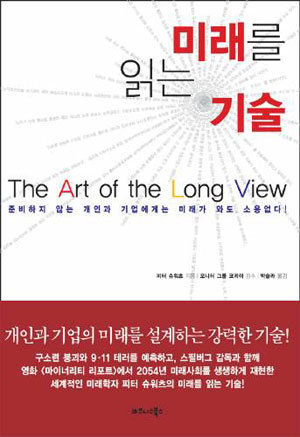Crystal Ball

Its impossible to accurately predict the future. It is possible, however, to predict all the scenarios that might occur in the future. Futurologist Peter Schwartz starts by illustrating why the scenario method would be helpful in forecasting the future, and offers a fun and easy explanation on the logic and philosophy behind a precise reading of the future. The most interesting part of the book is the prediction of the world in the year 2005, 15 years after the book was published in 1991. What did he predict for us?
First off, he predicted that a unified Germany would dominate economically and politically over the world. But contrary to his belief, Germany is still struggling from the socioeconomic aftermath of unification. For technology, he foresaw that the United States would lose its superiority to countries like South Korea where the education fever was high. In this, he was remarkably correct. Korea began to lead the information technology around the world since 2000, and shows great potential in biosciences and nanotechnology.
The author also wrote that the world would replace its ideologies with utilitarianism, and a new, younger generation of globetrotters would demolish boundaries between countries. Fifteen years afterwards, this prediction is settling into place.
Schwartz provided 3 scenarios for the world in 2005. The New Empire scenario predicted that nations constrained by trade regulations would start a unified economy and create a power block in the form of a federation. But the scenario of new empires like the United States and Japan, Russia and Germany forming united power blocks that would lead international changes is far from the reality of today.
The Domination of the Market scenario predicted that the economy logic would be prevalent, and instead of conglomerates, small and fast-moving companies would lead the economy. He forecasted a grim future for a change without progress scenario, where the gap between haves and have-nots would become extreme and humans would become slaves to technology.
Peter Schwartz also gave a scenario for Korea in 2005. He said, Around 2005, Korea will be a global leader in IT, and the younger generation who grew up with IT will be global leaders. If you consider the fact that the Internet had not yet been born in 1991, this prediction is eerily precise. On the other hand, he did have some far-fetched notions about Korea as well. He claimed that the public education system in the U.S. would be completely destroyed and in 2005, little American children would be shipped off to South Korea to receive its stellar education. Hearing this now, the irony is almost funny.
People are getting interested in the future now, more than ever. This means that the present is that much unstable, and the future seems that much more murky. At this point, a look at this book that boldly predicted our present 15 years ago will strike you as fun and refreshing.







